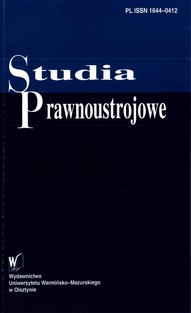Kilka refleksji odnośnie do trybów stosowania pracy zdalnej w świetle przepisów Kodeksu pracy
Some reflections on the modes of application of remote work in light of the provisions of the Labour Code
Author(s): Janusz WiśniewskiSubject(s): Labor relations, Human Resources in Economy, ICT Information and Communications Technologies, Labour and Social Security Law
Published by: Wydawnictwo Uniwersytetu Warmińsko-Mazurskiego w Olsztynie
Keywords: law remote work; accord; instruction; agreement; application; employer; employee;
Summary/Abstract: Regulating remote work in the Labour Code is undoubtedly one of the most important solutions in labour law, as it responds to the challenges of the modern labour market. It should be noted that this regulation was eagerly awaited by both employers and employees. The issues related to this regulation deserve special attention given that they have not been subject to closer analysis in labour law scholarly literature. Of particular theoretical and practical importance is the issue of the mode of application of remote work. De lege lata, fundamental significance in this matter is held by Article 6419 § 1 points 1 and 2, § 3, § 6, and § 7; Article 6722 §§ 1 and 2; Article 6733 §§ 1 and 2 of the Labour Code. According to these provisions, remote work can be applied as a result of an agreement between the parties to the employment contract, an instruction of an employer, an application of an employee who is in a particularly difficult personal or family situation, an application of an employee who makes a request for flexible work organisation, a request of an employee for occasional remote work. The objective of the paper is to analyse the above-mentioned modes of applying remote work, as the provisions regulating this matter raise interpretational doubts. The author regards the voluntary nature of remote work as the most useful principle from the point of view of the systematization of his reasoning. The essence of this principle lies in the legislator’s sanctioning of the possibility of transferring work to the employee’s private space. It is also worth emphasizing that by the possibility of performing work in the employee’s private space significantly considers the health aspect of remote work – the protection of the employee’s fundamental goods, i.e., health and life (Art. 6719 § 3 of the Labour Code).
Journal: Studia Prawnoustrojowe
- Issue Year: 2023
- Issue No: 61
- Page Range: 357-373
- Page Count: 18
- Language: Polish

